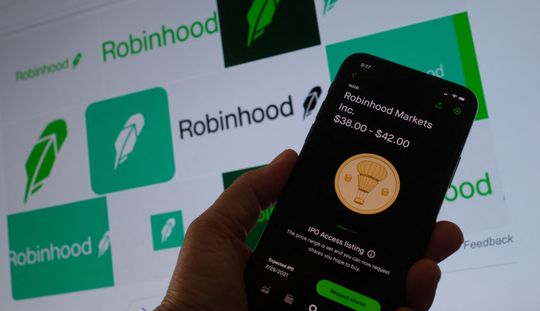Robinhood gets a lukewarm welcome as stock slips from IPO price
U.S. stocks ended higher Thursday after the Dow Jones Industrial Average and S&P 500 touched intraday records, as investors shrugged off a weaker-than-expected rise in second-quarter gross domestic product, focused on largely upbeat corporate earnings reports, and gave the trading debut of Robinhood Markets a tepid reception.
What are major indexes doing?
- The Dow Jones Industrial Average DJIA rose 153.60 points, or 0.4%, to close at 35,084.53, after hitting an intraday record of 35,171.52.
- The S&P 500 SPX was finished at 4,419.15, up 18.51 points, or 0.4%, after trading as high as 4,429.97.
- The Nasdaq Composite COMP advanced 15.68 points, or 0.1%, to end at 14,778.26.
On Wednesday, the Dow and the S&P 500 closed lower, while strong results from Google owner Alphabet Inc. GOOGL carried the Nasdaq Composite higher.
What’s driving the market?
U.S. gross domestic product grew at an annualized pace of 6.5% in the second quarter, falling short of the average forecast of 9.1% produced by a survey of economists by The Wall Street Journal. Separately, data from the Labor Department showed first-time applications for unemployment benefits fell 24,000 last week to 400,000.
“Today’s GDP report is a reminder that perspective is everything. Growth of 6.5% is robust by most measures, but against expectations for an advance of 8.5%, it’s still a disappointment,” said Jim Baird, chief investment officer at Plante Moran Financial Advisors.
The expansion was held down by a fall in government spending as federal stimulus payments declined in the second quarter, analysts noted. Meanwhile, consumer spending, the main engine of the economy, rocketed 11.8% higher in the spring, the GDP data showed. That’s four times faster than the typical increase each quarter.
“The return of household services consumption, from in-restaurant dining to recreation, was a force to be reckoned with in Q2, responsible for the lion’s share of economic gains for the quarter,” said Michael Reynolds, vice president of investment strategy at Glenmede, in emailed comments.
“For a sector that was decimated by a cliff of falling demand for much of the pandemic, it’s encouraging to see meaningful steps along the path of recovery from the services economy,” he said.
While it’s possible the second quarter could indeed mark “peak growth” in economic activity, it would not necessarily be a “market-shaping event” that investors should fear, Reynolds said.
“The reality is that ‘peak growth’ is a classic early cycle occurrence, typically marking the beginning of a developing and durable economic cycle, as growth settles in at lower (but more sustainable) levels,” he said.
Robinhood Markets HOOD made its long-awaited debut after pricing its initial public offering at the low end of expectations. Robinhood opened at $38 a share shortly after midday, then lost ground on Nasdaq, marking a lukewarm welcome as shares closed down 8.4%.
Meanwhile, pending home sales fell 1.9% in June, the National Association for Realtors said Thursday. Economists polled by The Wall Street Journal had projected a 0.5% gain.
The second quarter corporate earnings reporting season continues, with online retailing giant Amazon.com AMZN reporting after the close of trade, joining a host of other megacap companies that have delivered results this week.
Which companies are in focus?
- Trevor Milton, founder of electric truck manufacturer Nikola Corp. NKLA, was charged with lying to investors about the supposed technological breakthroughs the company had achieved in order to drive up its stock price, federal prosecutors announced Thursday. An attorney for Milton, who left the company in September, said his client had been “wrongfully accused.” Shares dropped more than 15%.
- Facebook Inc. FB shares fell 4%, as the social media giant, like other technology titans, topped second-quarter earnings estimates but also guided to slowing revenue growth in the second half of the year.
- PayPal Holdings Inc. PYPL beat estimates but said current quarter sales would miss expectations. Shares fell 6.2%.
- Ford Motor Co. F late Wednesday reported a surprise quarterly profit, saying “strong” demand for its vehicles allowed it to forgo discounts and flagged signs of improvement on chip supplies. Shares rose 3.8%.
- Mastercard Inc. MA shares gained 1.4%, after the company topped expectations with its second-quarter results Thursday amid a continued recovery in spending trends.
- Comcast Corp. CMCSA topped earnings and revenue expectations Thursday after showing some recovery in its parks business as well as continued growth in the cable segment. Shares rose 0.2%.
- Qualcomm Inc. QCOM earnings more than doubled in the second quarter, and executives said the chip company was significantly improving its access to foundries during a global semiconductor shortage in which capacity constraints have hampered the sector. Shares rose 6%.
- Uber Technologies Inc. UBER fell 3.1% after a report late Wednesday that SoftBank Group Corp. is selling about a third of its stake in the company.
What are other markets doing?
- Treasury prices fell, with the yield on the 10-year Treasury note BX:TMUBMUSD10Y rising to 1.273%, versus 1.259% at 3 p.m. Wednesday. Yields and debt prices move in opposite directions.
- The ICE U.S. Dollar Index DXY, a measure of the currency against a basket of six major rivals, fell 0.4%.
- Oil futures finished at their highest level in more than two weeks, with the U.S. benchmark CL00 rising 1.3%, while December gold futures GC00 GCZ21 jumped 1.7% to the highest close since June 16.
- In European equities, the Stoxx 600 Europe index XX:SXXP rose 0.5%, while London’s FTSE 100 UK:UKX advanced 0.9%.
- In Asia, the Hang Seng HK:HSI rallied 3.3% on reports Chinese authorities tried to placate top foreign institutions about a wave of regulatory actions. The index remains down 3.7% for the week. The Shanghai Composite CN:SHCOMP rose 1.5%, while Japan’s Nikkei 225 JP:NIK gained 0.7%.

